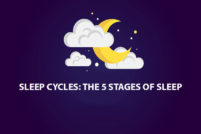Tryptophan is an “essential” amino acid because our bodies require it for proper functioning, yet cannot produce it on their own using more basic substances.
Rather, we must acquire it as part of our diets. Tryptophan is found in many foods, including dairy, eggs, meat, chicken, nuts and seeds. (2)
Tryptophan & Serotonin
Tryptophan is the key ingredient used by the body to synthesize the neurotransmitter serotonin, which regulates sleep, appetite, mood and our sensation of pain.
Once in the body, it is first converted into 5-HTP before being transformed into serotonin. (3)
High levels of serotonin lead to feelings of calm, relaxation and sleepiness. For this reason, many antidepressant medications function by increasing the level of serotonin available in the brain. (4)
Serotonin can then go on to be converted into the neurohormone: Melatonin.
Dietary Tryptophan Vs Supplements
While it’s a long held adage that eating foods high in tryptophan (such as turkey) will cause drowsiness, there are physiological reasons that the relationship isn’t quite this straight-forward.
Being the least plentiful of the 22 amino acids, once in the body tryptophan has to compete with all the others present in the blood in order to begin the process of being synthesized into neurotransmitters. (5)
However, there is evidence that consuming carbohydrates alongside foods high in tryptophan can increase its effects: Carbohydrates cause the body to release insulin which removes all amino acids — with the exception of tryptophan — from the blood.
The tryptophan then does not have to compete for priority to enter the brain, where it is then transformed into serotonin.
Tryptophan Supplements
Tryptophan supplements have a fundamentally different effect on the body than when it is consumed via food sources.
Over-the-counter supplements contain high enough concentrations of tryptophan to level the playing field in its competition with other amino acids in the blood. (6)
Potential Dangers: Can You Overdose on Tryptophan And Does It Have Side Effects?
In the past, tryptophan supplements were determined to be potentially unsafe due to a potential link with incidences of EMS (eosiniphilia-myalgia syndrome): a painful neurological condition.
However, the majority of these cases were traced back to a single manufacturer in Japan, and appeared to be associated with contaminated products. (7)
The use of tryptophan supplements has shown potential to cause certain side-effects, mainly affecting gastrointestinal tract.Side-effects directly linked to L-Tryptophan: (8)
- Heartburn
- Stomach pain
- Gas
- Nausea
- Vomiting
- Diarrhea
- Loss of appetite
Conversely, there are no known negative side-effects which result from consuming foods high in tryptophan.





